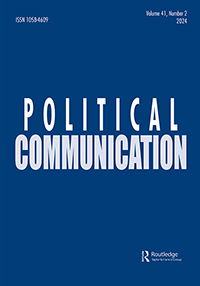“没有理由”:分析弗林在QAnon事件中的反悔双关语
IF 4.6
1区 社会学
Q1 COMMUNICATION
引用次数: 0
摘要
摘要随着数字组织、阴谋极端主义团体在美国越来越受到关注,研究人员面临着越来越多的呼声,要求他们更好地了解他们的群内和群外沟通策略。以QAnon阴谋社区为案例研究,我们使用新闻报道、社交媒体和围绕一次著名QAnon会议的民族志实地工作的数据,分析公众人物在活动中发表的一条有争议的评论的接受情况和后果。我们的混合方法分析发现,QAnon使用追溯双关语的努力产生了喜忧参半的结果,说服了一些成员重新解释评论;然而,它的有效性是有限的。我们的研究结果通过阐明QAnon运动中的反公众如何重建事件,并用修辞针调和矛盾的信息,为有关政治极端主义和数字媒体的文献做出了贡献。特别是,我们强调了反公众使用追溯双关语之前的因素,并讨论了使用它来协商群体内和群体外对事件的解释之间的紧张关系。本文章由计算机程序翻译,如有差异,请以英文原文为准。
“No Reason[.] [I]t /Should/ Happen here”: Analyzing Flynn’s Retroactive Doublespeak During a QAnon Event
ABSTRACT As digitally organized, conspiratorial extremist groups gain more attention in the United States, researchers face increasing calls to better understand their in-group and out-group communication strategies. Using the QAnon conspiracy community as a case study, we use data from news coverage, social media, and ethnographic field work surrounding a prominent QAnon conference to analyze the uptake and aftermath of a controversial comment made by a public figure at the event. Our mixed methods analysis finds that QAnon’s efforts to use retroactive doublespeak produced mixed results, persuading some members to re-interpret the comment; however, there was a limit to its effectiveness. Our findings contribute to the literature on political extremism and digital media by elucidating how anti-publics within the QAnon movement reconstruct events and thread the rhetorical needle to reconcile contradictory messages. In particular, we highlight the factors that precede anti-publics’ use of retroactive doublespeak and discuss its use to negotiate the tension between in-group and out-group interpretations of events.
求助全文
通过发布文献求助,成功后即可免费获取论文全文。
去求助
来源期刊

Political Communication
Multiple-
CiteScore
13.90
自引率
2.70%
发文量
30
期刊介绍:
Political Communication is a quarterly international journal showcasing state-of-the-art, theory-driven empirical research at the nexus of politics and communication. Its broad scope addresses swiftly evolving dynamics and urgent policy considerations globally. The journal embraces diverse research methodologies and analytical perspectives aimed at advancing comprehension of political communication practices, processes, content, effects, and policy implications. Regular symposium issues delve deeply into key thematic areas.
 求助内容:
求助内容: 应助结果提醒方式:
应助结果提醒方式:


